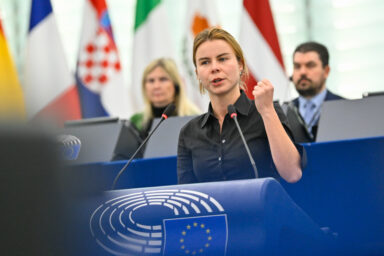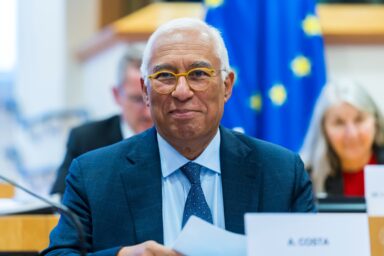In an interview for EU Perspectives, Dr Christiaan Keijzer discusses the Critical Medicines Act (CMA), pharmaceutical legislation reform, and stresses why doctors must help shape Europe’s medicine supply policies. Dr. Keijzer is an anaesthesiologist and anaesthesiology training director at Radboud University Medical Center in the Netherlands. He currently serves as Immediate Past President of the Standing Committee of European Doctors (CPME), after previously holding the roles of Vice President and President.
Since his vice presidency, Dr Keijzer has led CPME’s pharmaceutical and medical devices work, representing the organisation at the European Medicines Agency and chairing its dedicated working group on pharma, particularly active during the EU’s pharmaceutical reform and development of the Critical Medicines Act.
Interview
What are your main concerns about the current draft of the Critical Medicines Act?
We’re particularly concerned about the weak obligations on pharmaceutical companies regarding supply security. If you introduce public funding to support production or supply, then you also need to require clear commitments in return. Currently, the text uses very general terms, which risks allowing a company to receive funding without delivering, and facing no consequences. We’ve argued that there need to be binding commitments and, if unmet, financial sanctions. That principle of accountability is missing.
Is there overlap with the pharmaceutical legislation reform?
Yes, absolutely. The issues are very much interconnected. But the timelines are different: the pharma legislation will take more time to finalise. Still, on many topics, like obligations, pricing, and supply, we’re taking consistent positions in both files.
What’s your position on how the EU should handle medicine stockpiling?
Stockpiling is officially a member state responsibility, but as we saw during COVID, uncoordinated national action can worsen shortages in other countries. If one country stockpiles, it can deprive others of access. That’s why we think stronger EU-level coordination is essential. Member states should notify the European Commission and the Critical Medicines Coordination Group in advance of any stockpiling measures. Transparency and coordination will ensure that national actions don’t undermine EU-wide preparedness.
You might be interested
Is the Critical Medicines Coordination Group sufficient for that coordination?
It’s a start, but only if it’s empowered. Member states must actually share information with the group. The group must also take responsibility for communicating with them and ensuring actions in one region don’t create shortages in another. Right now, that isn’t happening consistently.
HERA is also looking into more coordinated stockpiling. But the problem remains that many still see this as strictly a national issue. We believe this view is outdated. A bit more coordination, without undermining national sovereignty, would significantly improve the system.
Do you have a concrete proposal for improving stockpiling coordination?
Yes. Use the existing Coordination Group, but define its role more clearly and require member states to report stockpiling actions. Establish shared definitions and responsibilities. Only then can you avoid disruptions and duplication.
Are healthcare professionals like doctors and pharmacists involved in the governance structures proposed under the Critical Medicines Act?
No, and that’s a major gap. The current draft does not include healthcare professionals in the governance or decision-making bodies, such as the Coordination Group. That’s problematic, because we are the ones who manage the impact of medicine shortages on the ground.

The current draft does not include healthcare professionals in the governance or decision-making bodies, such as the Coordination Group. That’s problematic, because we are the ones who manage the impact of medicine shortages on the ground. – Dr Christiaan Keijzer
Doctors and pharmacists are the ones identifying alternatives, adjusting treatments, communicating with patients, and navigating supply challenges. In the Netherlands, for instance, every community pharmacy has at least one full-time pharmacist working solely on shortages. Yet our perspective and expertise are missing from the structures tasked with solving these problems at the EU level.
Have you proposed changes to include healthcare professionals?
Yes. We’ve tabled amendments calling for formal involvement of healthcare professionals, particularly in the Coordination Group. Our experience helps ensure that policies reflect practical reality. We’ve seen it work at the European Medicines Agency, where open calls for working group positions allow European medical organisations to submit candidates. We could apply a similar model here. The CMA proposal doesn’t currently define it, which is why we’ve urged both the Parliament and the Council to consider this in their positions.
How does lack of transparency affect both supply security and medicine availability in the EU?
Transparency is absolutely critical. One major gap lies in how public funding is handled. If pharmaceutical companies receive EU support to stabilise supply or expand production, the EU must attach clear conditions. Right now, companies can receive funding without firm obligations, and no mechanism to ensure accountability if they don’t deliver. That’s a serious flaw.
There’s also a lack of transparency when it comes to pricing, especially for new medicines or biosimilars. So-called “me-too” products often enter the market at equal or even higher prices despite offering no major advantage. In a functioning market, competition should lead to lower prices, but that often doesn’t happen. We also need visibility into national stockpiling, raw material sourcing, and early shortage notifications. If every member state acts independently and without coordination, the EU loses the ability to respond effectively and collectively.
What are the main challenges in how the EU pharmaceutical market functions today?
One of the core problems is that we don’t truly have a single European market for medicines. Prices vary widely between member states, which means companies prioritise higher-paying markets. Countries with lower reimbursement levels often face more frequent or prolonged shortages. This undermines the idea of equal access to medicines across the EU.
During COVID, joint procurement worked well for vaccines. It showed what’s possible when member states act together. Unfortunately, under the current EU treaties, joint procurement for regular medicines isn’t feasible. But we can still coordinate better, on production, raw materials, and pricing strategies.
Is there anything specific missing in the CMA text now?
Yes, especially the conditions tied to funding. If the EU provides financial support for resilience or manufacturing, it must be conditional. If a company fails to deliver, there should be a repayment obligation. Right now, the wording is vague. We also need more detail on the “Bolar exemption”, which should allow earlier generic and biosimilar competition. Both the CMA and the pharma package include the provision, but neither defines it clearly.
What does this all mean for daily clinical practice? Have you seen real-world impacts?
Definitely. Take amoxicillin, for example. During a winter shortage, several countries switched to broader-spectrum antibiotics. That has long-term consequences for antimicrobial resistance. We’ve also had cases where patients couldn’t get their medications. Some had to switch to less effective alternatives.
Pharmacists spend hours checking stock, finding alternatives, contacting doctors, and informing patients.
How is this affecting professionals and patients?
Pharmacists spend hours checking stock, finding alternatives, contacting doctors, and informing patients. In the Netherlands, we’ve developed a system that shows real-time availability and suggests alternatives. But not every country has this, and it’s far from perfect. Patients are understandably upset when told their medicine isn’t available. Even if the clinical impact is mild, the psychological impact can be significant. Trust in the system erodes, and the time burden on providers increases massively.
It sounds like you’re frustrated by how these policies are drafted.
Yes. What we’ve learned over the years, whether it’s the European Health Data Space, AI Act, or now the CMA, is that policies are too often drafted in isolation, without input from professionals. Later, we’re invited to submit consultation responses and amendments, but by then, the core structure is already fixed. Early involvement of healthcare providers would make the process more efficient and result in better legislation. We’ve seen that when we table well-reasoned amendments, they’re often accepted. So why not involve us from the beginning?
Do you have any final recommendations to lawmakers?
Keep your coordination efforts strong and meaningful. Make transparency a priority. Ensure pharmaceutical companies are held accountable when public funds are used. And finally, always include healthcare professionals at the table when drafting legislation that affects patient care.











